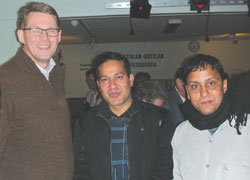 HELSINKI - We are used to having election observers come to Nepal to see if our voting is free and fair. They come from democracy watchdogs, the European Union, or the neighbouring SAARC country, and inspect voting procedures.
HELSINKI - We are used to having election observers come to Nepal to see if our voting is free and fair. They come from democracy watchdogs, the European Union, or the neighbouring SAARC country, and inspect voting procedures.
But here we were, Nepali journalists monitoring the general elections in Finland for a change. This was what voting in a mature democracy was like, we thought, and it couldn't be more different than elections back home.
It's been eight years since our last elections, so our memories of them are a bit hazy. But we recall the notoriously unstable years of Nepal's coalition politics, having 12 governments in 11 years and four elections in a decade.
The biggest attitudinal difference between politics in Finland and Nepal is that Finnish voters weren't terribly worried that the contending parties didn't win an absolute majority. In fact, they seemed to prefer it that way.
The Centre Party won 51 percent of the seats in the 200-member parliament, the National Coalition Party got 50, and the Social Democrats 45. The Leftwing Alliance (17) and Green League (15) trailed, and other smaller parties totalled 22 seats. Forty-six percent of the seats went to women, making Finland second only to Sweden in the number of women in parliament.
Campaigning was also completely different. There weren't any rallies along the main streets that caused traffic snarls in the city centre as party supporters marched for aam sabhas. No posters on walls and tempos with loudspeakers. Candidates stood outside department stores distributing stickers. "I was born here," said one candidate in a Helsinki suburb, "I know almost everyone by name."
Finnish electoral laws are liberal and everyone obeys them. Parties have to present their statement of account as soon as polling is finished. Even MPs are taxed 38 percent on their salaries. Property, earnings and campaign financing are transparent.
Used to reading tomes that go for election manifestos in Nepal, the electoral issues here were refreshingly different. At a campaign debate, they were: protecting democracy in Asia, preventing hunger in Africa, discussing what to do about climate change, and asking how to bolster Finland's ties with the EU.
When the results were announced, the National Coalition Party had increased its seat numbers by ten percent compared with the 2003 election, at the expense of the Social Democrats. Analysts were trying to figure out why. But this didn't seem to indicate any major shift in political focus of the government.
"Finland is a unique multi-party democracy, it has a tradition of cooperative, not competitive politics," explains Kimo Grunlund, a university professor.
This could be seen in the way Prime Minister Matti Vanhanen was running his campaign in a town 80 km outside Helsinki. He wasn't running down his rivals, in fact he had nothing nasty to say about anyone, just a low-key speech on how he'd do his job even better.
The most important lessons Nepali political parties can take from Finland are: to have a minimum understanding on national interest, ensure continuity of basic policies with cooperation between parties, and respect for minorities and the smaller parties.
After all, politics is not really about politics. An election is just a mechanism to select the most efficient managers to run the country for four years so they can improve the lives of citizens. If they do their jobs well, they get re-elected. If they don't, they lose.
Here, on the other hand, politics is everything. Those who win think they can do anything. Those who lose, lose all. Just look at the unseemly scramble this week for ministerial portfolios in the interim government. And we haven't even had elections yet.
Shiva Gaunle is editor of Himal Khabarpatrika.



